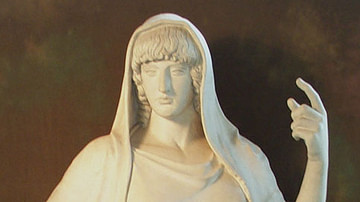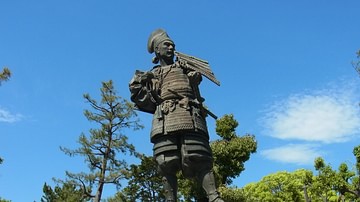Search
Search Results

Definition
Teutonic Knight
A medieval Teutonic Knight was a member of the Catholic military Deutscher Orden or Teutonic Order, officially founded in March 1198 CE. The first mission of the Teutonic knights was to help retake Jerusalem from the Arabs in the Third Crusade...

Definition
Hestia
Hestia was the Greek virgin goddess of the hearth, home, and hospitality. In Greek mythology, she is the eldest daughter of Cronus and Rhea. In her role as a protector of the family and political community, sacrifices and offerings were regularly...

Definition
Ghost Dance
The Ghost Dance (Spirit Dance) is an expression of rebirth and renewal using the traditional Native American circle dance, first practiced by the Paiute Nation in 1869 and again in 1889 when it was adopted by other Plains Indians nations...

Definition
Animal Husbandry
Animal husbandry is commonly defined as a branch of agriculture dealing with the domestication, breeding, and rearing of animals for various purposes including labor (as in the case of large animals), a food source, protection, and companionship...

Definition
Phoenician Art
The art of the ancient Phoenicians, which flourished between the 19th and 4th centuries BCE, was exported throughout Mesopotamia and the ancient Mediterranean. Best known for their work on small decorative objects, Phoenician artists skillfully...

Definition
Hallstatt Culture
The Hallstatt culture is named after the site of that name in Austria and it flourished in central Europe from the 8th to 6th century BCE. The full period of its presence extends from c. 1200 to c. 450 BCE - from the Late Bronze Age to the...

Definition
Mountain Meadows Massacre
The Mountain Meadows Massacre (11 September 1857) was a conflict between the Mormons (Church of Jesus Christ of Latter-day Saints) and the wagon train of the Baker-Fancher party, who were traveling through Utah to California, resulting in...

Definition
Persian Immortals
The Ten Thousand Immortals were the elite force of the Persian army of the Achaemenid Empire (c. 550-330 BCE). They formed the king's personal bodyguard and were also considered the shock troops of the infantry in Persian warfare. They are...

Definition
Oda Nobunaga
Oda Nobunaga was the foremost military leader of Japan from 1568 to 1582. Nobunaga, along with his two immediate successors, Toyotomi Hideyoshi (1537-1598) and Tokugawa Ieyasu (1543-1616), is credited with unifying medieval Japan in the second...

Definition
Carthaginian Art
The art of the Carthaginians was an eclectic mix of influences and styles, which included Egyptian motifs, Greek fashion, Phoenician gods, and Etruscan patterns. Precious metals, ivory, glass, terracotta, and stone were transformed into highly...